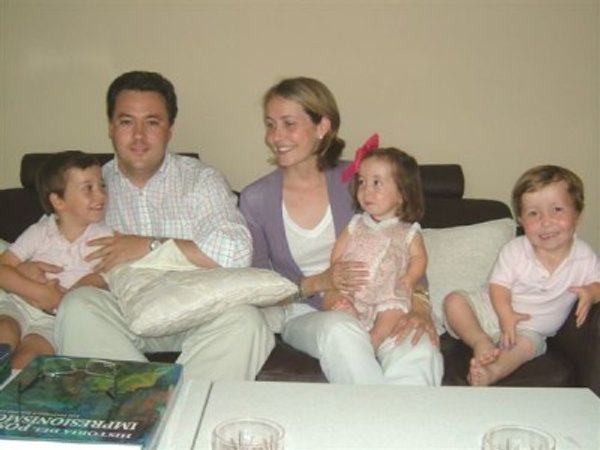Ana studied humanities at the university and is now the director of an educational center for young children in Pamplona, the capital of Navarre, Spain. Thomas is a radiologist at St. Michael’s Hospital in Pamplona. Both are members of Opus Dei.
Thomas and Ana were married seven years ago in Precious Blood parish in Castellon. They began their life together with great hopes and dreams for the future. The photo below stands on their dining room bureau.

Ana became pregnant shortly after getting married. At 6 weeks she had a sonogram: "the one filled with hope," as she and her husband Thomas put it. The second sonogram, taken at 12 weeks, was "the one filled with doubts," Thomas said. As a radiologist, he was concerned about the size of the extremities on the growing child….
The third sonogram, at 20 weeks, was the "knockdown punch." There was a great probability that their child suffered from a condition that would result in death during delivery or soon afterwards. It was quite likely that their son would be born and die at the same time.
"Your son is breathing. It seems he wants to live."
Thomas has a recessive gene that is hereditary and Ana has the same gene. This is something that occurs only in one of 150,000 cases, and it had affected the child they were expecting.
Every night Ana prayed to God: "If you have given me this child, why are you going to take him away from me? Send him to me sick, but don’t take him away from me. He is my son." They didn’t buy a crib or any toys. They went to the high-risk maternity ward at the Virgin of the Way Hospital, and used all the means available so that their son would live as long as possible. Ana gave birth, and Thomas took the baby and baptized him right there in the delivery room. They called him Michael. Ana asked if her son had already died. She could hear a baby crying nearby. The doctor said: "You son is breathing. It seems he wants to live."

Michael is now six years old. He suffers from diastrophic dysplasia. The word "diastrophic" is a geological term that is applied to mountains. In a person with this condition, the skeleton fossilizes. A moment will come when their son will not be able to move; he will not be able to walk. And all this as the result of an inherited recessive gene united to another identical, inherited recessive gene.
"It is truly a blessing to have a child. He is your child and you love him, regardless of his condition. When you really love someone his condition makes no difference," his mother said.
A statistical analysis of the gene that both Thomas and Ana carry shows that, out of every four pregnancies, one will be affected by this condition.
Next came John, perfectly healthy; he is now almost four. And then, unexpectedly, Jimena….
"I’ve found something worth giving my life for"
The same thing happened with Jimena as with Michael: a sonogram at 6 weeks, and another at 12 weeks. Now they knew their daughter was also affected. And "that was the culminating moment," Thomas says, "because you know what you are facing and, precisely because you know it, you collapse. But, either you believe in God or you don’t. It’s clear that God is behind all of this. Nothing escapes him. Jimena was in his plans. God doesn’t take coffee breaks. He doesn’t make mistakes. He watches over you, over us."

Jimena is now two-and-a-half years old but she can’t walk yet. She shares the same condition as her brother, Michael, who is already in first grade. Her parents see that, in their daily life, Michael will help Jimena and Jimena will help Michael. And John, in the middle, will come to understand that "a sick person is a treasure," as St. Josemaria liked to say.
Ana says: "In our society you don’t see children with this condition because if there is even the slightest suspicion, they are aborted. But I have someone I can devote my mind, my life, my soul and my heart to. I can’t forget about my children. If I can bear this, I’ll be able to confront anything. I’ve found something worth giving my life for: my three children make my life worthwhile."
"This is both God’s and mine"
"Being a member of Opus Dei brings me a great peace," Ana says. "I never feel alone. I know that many people are keeping me company. I have come to understand that God is ‘chiseling’ me to the shape he wants through this great trial. It hasn’t been easy. But there comes a moment when you see that ‘this’ is both God’s and mine." Thomas adds: "Suffering is a point of contact with God. There I find him, sustaining me every day. Suffering is incommunicable. I have come to see that believing in God, in Christ on the Cross, is the key for accepting this situation."
Ana and Thomas and their children are clearly a happy family, one filled with joy. They are a family that has been thrice blessed. Michael is a rascal; he drags his feet when it is time for his bath. John draws pictures of the soccer players on his team, while Jimena clamors for her mother’s atttention. For too long now, she hasn’t held her in her arms….
